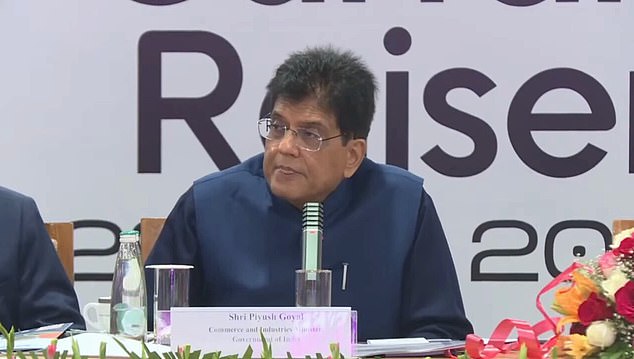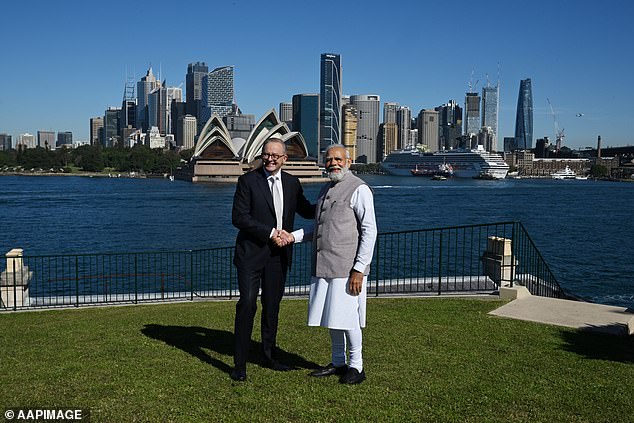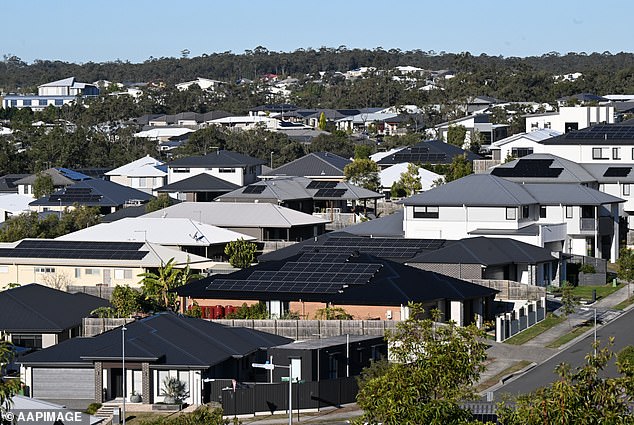A senior member of the Indian Government has made a surprising proposal to help tackle Australia’s housing crisis, suggesting India could help build one million homes across the country.
The comments came from India’s Commerce and Industry Minister, Piyush Goyal, during a meeting with a United Arab Emirates trade delegation in Mumbai on Sunday.
Goyal described the initiative as a ‘$500billion opportunity’ and claimed India was in ‘deep negotiations’ with Australia to deliver the massive housing project.
He added that Australia is open to welcoming Indian professionals, including masons, electricians, plumbers, and other trades, while also offering financial support to help businesses establish themselves.
‘They are willing to allow you to take all the different technical expertis… whatever professions or skills are required to build those million homes,’ he said.
Mr Goyal said India would provide full access to both skilled and unskilled Indian workers, alongside training and certification programs to ensure compliance with Australian standards.
‘If we miss the bus, if we don’t catch this opportunity, we will only have ourselves to blame,’ he said.
The comments coincide with ongoing negotiations between Australian Trade Minister Don Farrell and the Indian Government over an expanded Free Trade Agreement, including the second tranche of the India-Australia Comprehensive Economic Cooperation Agreement.

Piyush Goyal (pictured) on Sunday, during a meeting with a UAE trade delegation in Mumbai

India’s Prime Minister Narendra Modi (right) with Anthony Albanese in 2023
In July, Farrell said the government was in the ‘final stages of negotiations’ with India.
Goyal confirmed the talks were continuing in a social media post earlier in August.
‘Held a productive meeting with Australian Minister of Trade & Tourism Senator the Hon Don Farrell. Our discussions centred on finalising the second tranche of the CECA to further enhance the trade & investment ties between our nations,’ he said.
However, the proposal has sparked confusion in Australia, with economist Leith van Onselen revealing to Daily Mail that he was contacted by a government source who denied any knowledge of the plan.
‘I received a call from a government spokesperson who said, “[Goyal’s] plan has not been raised with them”,’ van Onselen said.
‘This is truly extraordinary stuff, assuming it is real and not merely bluster and hopium from Minister Piyush Goyal.’
It is understood the Australian government was blindsided by the comments, which were not previously brought up during negotiations.

Negotiations between Goyal (left) and Trade Minister Don Farrell (right) are ongoing

Forecasts show the government is set to miss it’s housing target by 200,000 homes (stock)
Van Onselen also criticised the broader context of Australia’s housing shortage, blaming decades of high immigration for outpacing housing supply.
‘Australia is suffering from a chronic housing shortage because, for two decades, population demand via excessive immigration has run ahead of housing supply,’ he said.
He urged the Albanese Government to publicly reject the proposal.
‘The Albanese government needs to make an official public statement denying Minister Piyush Goyal’s claims,’ van Onselen added.
The Daily Mail has approached Farrell for comment.
Recent housing approval data revealed that the Australian Government is on track to fall significantly short of its target to build 1.2million homes by 2029.
The figures show an annual shortfall of around 36,000 homes, which would leave the government nearly 200,000 homes behind its goal by the end of the decade.
Share or comment on this article:
REVEALED: India’s bold proposal to fix Australia’s housing crisis – by building one million homes here and sending skilled and unskilled workers to help